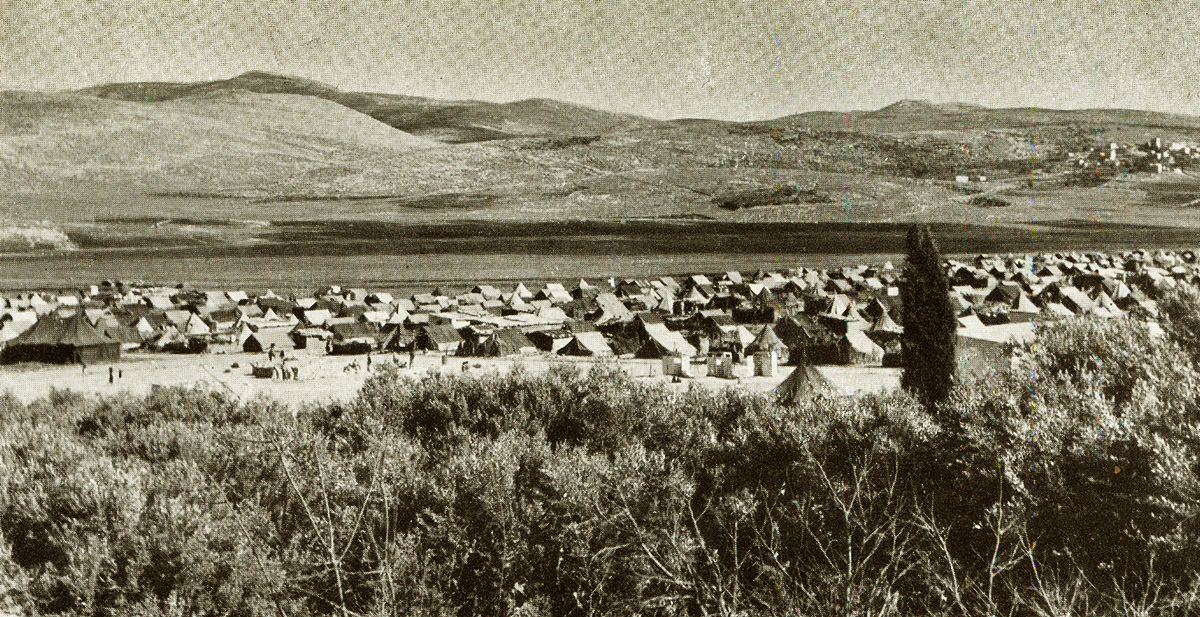Nation states make refugees and in historical turn, occasionally at least, refugees make nation states. At times – and now is one of them – it can seem as though there is nothing between the eruptive violence of state formation and the slow burn of placelessness without end. Except, of course, entire lives are lived in-between nation states, and have been since the beginning of the twentieth century. A memory of multiple displacements across generations now stretches from the colonial mandate system and the minority treaties through de-colonisation and the Cold War to the permanent refugee camps, urban ghettoes, borderlands, and detention centres of today. Refugee history has an archive. For millions, it is an archive that is lived in daily.
Baddawi refugee camp in North Lebanon was created in 1955. Home to approximately 40,000 “established” Palestinian refugees, the camp over the years has created communities and cultures and endured civil war and lawlessness. Since 2011, the people of Baddawi have also hosted thousands of refugees fleeing the war in Syria, a country that owes its borders to the shifting refugee populations of twentieth-century colonial, mandate, and postcolonial politics (Thomas-White, 2017). There is much shared refugee history between Baddawi’s old and new residents, so much so that many refugees from Syria identified the camp, and not Lebanon, as their desired destination even before they left (Fiddian-Qasmiyeh, 2016). Baddawi today is a kind of lieu de mémoire, operating proleptically for the nation-less, not analeptically, as memory sites tend to do in nation building.
Since 2011, the poet and translator Yousif M. Qasmiyeh, who was born in Baddawi and now lives in the United Kingdom, has been documenting how the arrival of this new generation of refugees is transforming the physical, social, existential, and psychic life of Baddawi as part of a collaborative project on refugee hosting (Refugee Hosts).
For Qasmiyeh, Baddawi is not (or at least not in any easy sense) simply a place where refugees live, but is made and remade of multiple refugee histories. “The camp is time,” he insists repeatedly. This insistence is a direct challenge to the representation of refugee camps as ahistorical spaces of timeless – and agentless — suffering. As historians of humanitarianism have shown, the de-politicization of refugee crises since the middle of the twentieth century has had the thoroughly political consequence of silencing, and in some cases – notably the Palestinians – obliterating refugee history. By superseding the refugee camp of the humanitarian imaginary with the idea of a constantly written archive of refugee memory – the camp as time not (just) humanitarian space – Qasmiyeh is also claiming the right to name the camp for generations of refugees, past and future: “Only refugees can forever write the archive,” he writes in the poem published below: “The camp owns the archive, not God.” Not God, and not those who treat the camps as sandpits for their own maladroit Mideast power-politics either, we want might add in the light of recent efforts to impose a new “peace” process.
This is hardly utopian living; it is necessary living. But the avowal of what it means to be stateless present in the weft and weave of Baddawi – its archive — does perhaps suggest some new imaginative terms for thinking about different possibilities for citizenship between the nation state and its assumed negatives — statelessness, displacement, refugeedom. “In writing about these events and others,” Qasmiyeh said in a recent interview, “we chase the camps as if we were chasing ourselves in details that are no longer there to be observed transiently but to be inscribed and re-inscribed to create a new archive, that of the upcoming and the future.”
***
Writing the camp-archive
By Yousif M. Qasmiyeh
I
Only refugees can forever write the archive.
The camp owns the archive, not God.
For the archive not to fall apart, it weds the camp unceremoniously.
The question of a camp-archive is also the question of the camp’s survival beyond speech.
Circumcising the body can indicate the survival of the place.
Blessed are the pending places that are called camps.
II
My father, who passed his stick on to me, lied to us all: I slaughtered your brother so you would grow sane and sound.
My mother, always with the same knife, cuts herself and the vegetables.
The eyes which live long are the ones whose sight is contingent upon the unseen.
III
God’s past is the road to the camp’s archive.
We strangle it, from its loose ends, so we can breathe its air.
Privileging death in the camp is the sacral of the refugee body.
Without its death, the archive will never exist.
In whose name is the camp a place?
It is the truth and nothing else that for the camp to survive it must kill itself.
IV
The transience of the face in a place where faces are bare signs of flesh can gather the intransience of the trace therein in its multiple and untraced forms.
The unseen – that is the field that is there despite the eye – can only be seen by the hand. After all, the hand and not the eye, is the intimate part.
The tense in our bones – the one that emerged in no time, but with the desire to be time – will always be ahead of us.
V
Green in the camp only belongs to the cemetery.
The veiled women crying at the grave are my mother and my sisters. Once, my mother wanted to bring the grave home with her.
In the solemnity of the place, faces fall like depleted birds.
In belonging to the camp, senses premeditate their senses


